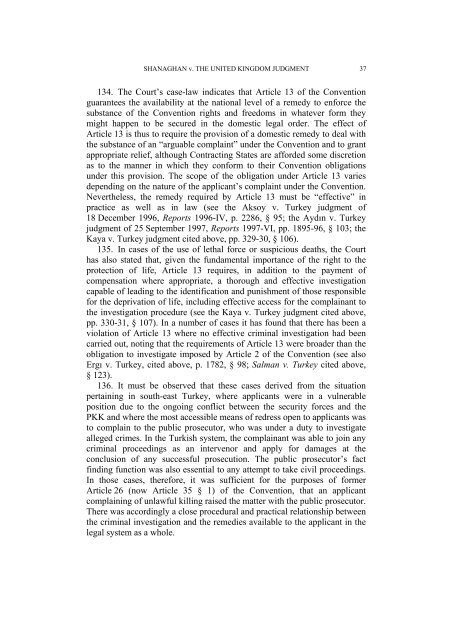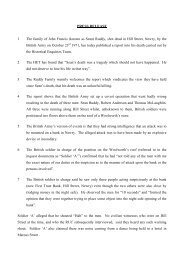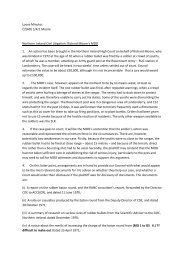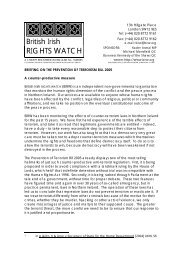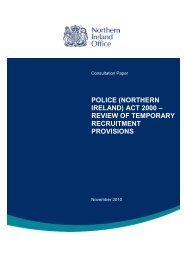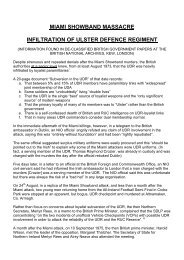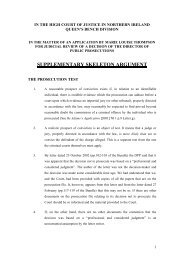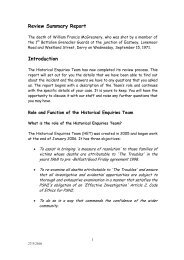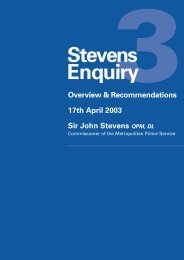Patrick Shanaghan v the United Kingdom - The Pat Finucane Centre
Patrick Shanaghan v the United Kingdom - The Pat Finucane Centre
Patrick Shanaghan v the United Kingdom - The Pat Finucane Centre
Create successful ePaper yourself
Turn your PDF publications into a flip-book with our unique Google optimized e-Paper software.
SHANAGHAN v. THE UNITED KINGDOM JUDGMENT 37<br />
134. <strong>The</strong> Court’s case-law indicates that Article 13 of <strong>the</strong> Convention<br />
guarantees <strong>the</strong> availability at <strong>the</strong> national level of a remedy to enforce <strong>the</strong><br />
substance of <strong>the</strong> Convention rights and freedoms in whatever form <strong>the</strong>y<br />
might happen to be secured in <strong>the</strong> domestic legal order. <strong>The</strong> effect of<br />
Article 13 is thus to require <strong>the</strong> provision of a domestic remedy to deal with<br />
<strong>the</strong> substance of an “arguable complaint” under <strong>the</strong> Convention and to grant<br />
appropriate relief, although Contracting States are afforded some discretion<br />
as to <strong>the</strong> manner in which <strong>the</strong>y conform to <strong>the</strong>ir Convention obligations<br />
under this provision. <strong>The</strong> scope of <strong>the</strong> obligation under Article 13 varies<br />
depending on <strong>the</strong> nature of <strong>the</strong> applicant’s complaint under <strong>the</strong> Convention.<br />
Never<strong>the</strong>less, <strong>the</strong> remedy required by Article 13 must be “effective” in<br />
practice as well as in law (see <strong>the</strong> Aksoy v. Turkey judgment of<br />
18 December 1996, Reports 1996-IV, p. 2286, § 95; <strong>the</strong> Aydõn v. Turkey<br />
judgment of 25 September 1997, Reports 1997-VI, pp. 1895-96, § 103; <strong>the</strong><br />
Kaya v. Turkey judgment cited above, pp. 329-30, § 106).<br />
135. In cases of <strong>the</strong> use of lethal force or suspicious deaths, <strong>the</strong> Court<br />
has also stated that, given <strong>the</strong> fundamental importance of <strong>the</strong> right to <strong>the</strong><br />
protection of life, Article 13 requires, in addition to <strong>the</strong> payment of<br />
compensation where appropriate, a thorough and effective investigation<br />
capable of leading to <strong>the</strong> identification and punishment of those responsible<br />
for <strong>the</strong> deprivation of life, including effective access for <strong>the</strong> complainant to<br />
<strong>the</strong> investigation procedure (see <strong>the</strong> Kaya v. Turkey judgment cited above,<br />
pp. 330-31, § 107). In a number of cases it has found that <strong>the</strong>re has been a<br />
violation of Article 13 where no effective criminal investigation had been<br />
carried out, noting that <strong>the</strong> requirements of Article 13 were broader than <strong>the</strong><br />
obligation to investigate imposed by Article 2 of <strong>the</strong> Convention (see also<br />
Ergõ v. Turkey, cited above, p. 1782, § 98; Salman v. Turkey cited above,<br />
§ 123).<br />
136. It must be observed that <strong>the</strong>se cases derived from <strong>the</strong> situation<br />
pertaining in south-east Turkey, where applicants were in a vulnerable<br />
position due to <strong>the</strong> ongoing conflict between <strong>the</strong> security forces and <strong>the</strong><br />
PKK and where <strong>the</strong> most accessible means of redress open to applicants was<br />
to complain to <strong>the</strong> public prosecutor, who was under a duty to investigate<br />
alleged crimes. In <strong>the</strong> Turkish system, <strong>the</strong> complainant was able to join any<br />
criminal proceedings as an intervenor and apply for damages at <strong>the</strong><br />
conclusion of any successful prosecution. <strong>The</strong> public prosecutor’s fact<br />
finding function was also essential to any attempt to take civil proceedings.<br />
In those cases, <strong>the</strong>refore, it was sufficient for <strong>the</strong> purposes of former<br />
Article 26 (now Article 35 § 1) of <strong>the</strong> Convention, that an applicant<br />
complaining of unlawful killing raised <strong>the</strong> matter with <strong>the</strong> public prosecutor.<br />
<strong>The</strong>re was accordingly a close procedural and practical relationship between<br />
<strong>the</strong> criminal investigation and <strong>the</strong> remedies available to <strong>the</strong> applicant in <strong>the</strong><br />
legal system as a whole.


